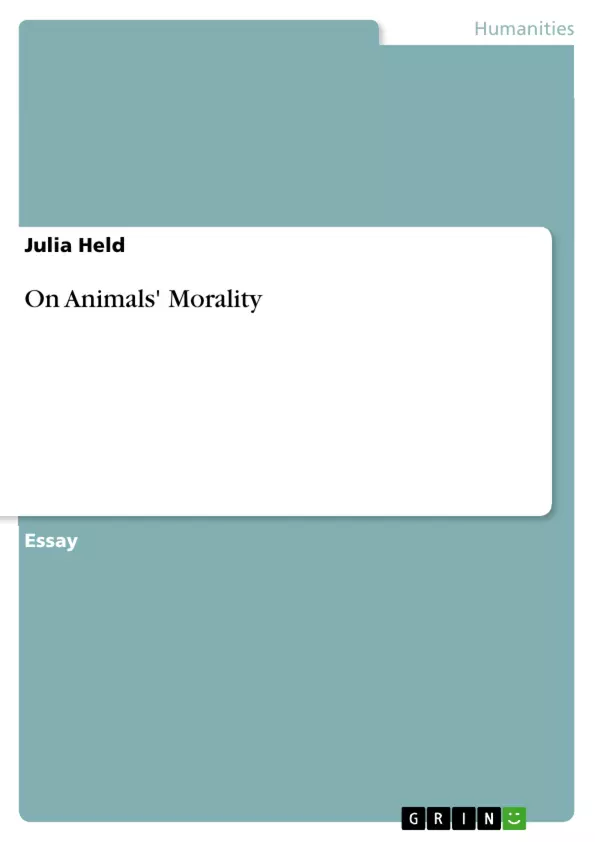In this paper, I will reject the Kantian claim that animals’ behaviour can’t be morally assessed. On the contrary, I will show how animals’ behaviour can indeed be morally assessed, even if we can’t ascribe a sort of human-like normative morality to them, since they don’t use language and thus have no concept of morality.
Before stating my argument, I want to avoid any misunderstanding by specifying some central notions, i.e. “humans”, “animals” and “moral sensitivities”.
The reader will often be confronted with the terms “humans” and “animals”. Here I want to clarify that a mental division between us, as human animals, and animals, as non-human animals should be avoided. Such a separation usually leads to an overestimation and the assessment of humans being the only ones capable of morality on earth, mainly because of their advanced minds and intellect. Therefore, when considering the problem of moral assessment to animals, an imaginary hierarchical classification should be avoided in order to see what the essence of morality lies in, namely an innate moral sensitivity which humans share with some (or many) animals.
Inhaltsverzeichnis (Table of Contents)
- 1. INTRODUCTION
- 2. KEY ARGUMENT
- 3. THE KANTIAN APPROACH ON ANIMALS' MORALITY
- 4. WHY ANIMALS' BEHAVIOUR IS MORALLY ASSESSABLE
- 5. CONCLUSION
Zielsetzung und Themenschwerpunkte (Objectives and Key Themes)
The paper challenges the Kantian notion that animal behavior cannot be morally assessed. It argues that animals can indeed be morally assessed, despite lacking a human-like understanding of morality. The paper delves into the concept of "moral sensitivities," highlighting the role of both altruistic and egoistic feelings in shaping animal behavior.
- Moral Assessment of Animal Behavior
- Kantian Approach to Morality
- Moral Sensitivities in Animals
- Altruistic and Egoistic Feelings
- The Role of Language in Morality
Zusammenfassung der Kapitel (Chapter Summaries)
- 1. INTRODUCTION: This chapter introduces the main argument of the paper, which rejects the Kantian view that animal behavior is not morally assessable. It defines key terms, such as "humans," "animals," and "moral sensitivities," and clarifies the distinction between human animals and non-human animals. It also defines "moral sensitivities" as feelings arising from either altruistic or egoistic motivations.
- 2. KEY ARGUMENT: This chapter presents the main argument of the paper, which is based on two premises: (P1) If a being is capable of feeling and acting on moral sensitivities, then the behavior of that being is able to be morally assessed. (P2) Some animals are capable of feeling and acting on moral sensitivities. The conclusion is that therefore, the behavior of some animals is able to be morally assessed. This argument challenges the Kantian view on animal morality.
- 3. THE KANTIAN APPROACH ON MORALITY: This chapter explains the Kantian approach to morality, which holds that only humans, with their capacity for language and self-consciousness, can be considered moral agents. It outlines Kant's categorial imperative and the importance of deliberating on moral reasons. It argues that humans are unique in their ability to reflect on their motivations and actions, allowing them to make rational judgments and control their behavior.
- 4. WHY ANIMALS' BEHAVIOUR IS MORALLY ASSESSABLE: This chapter lays out the arguments in favor of the claim that animal behavior can be morally assessed. It critiques the Kantian view that animals lack the capacity for morality due to their reliance on instincts. It suggests that animals, while not necessarily reasoning about moral principles in the same way humans do, still possess moral sensitivities that make their behavior morally relevant.
Schlüsselwörter (Keywords)
The key terms and concepts explored in this paper include: animal morality, Kantian ethics, moral sensitivities, altruism, egoism, language, self-consciousness, behavior assessment, instinct, and rationality. It investigates whether animal actions can be assessed through a moral lens, challenging the Kantian view that morality is uniquely human.
Frequently Asked Questions
Can animal behavior be morally assessed?
The paper argues that animal behavior can indeed be morally assessed because some animals are capable of feeling and acting on moral sensitivities.
How does this view differ from the Kantian approach?
Kant claimed that only humans are moral agents due to their capacity for language and self-consciousness; this paper rejects that exclusive claim.
What are "moral sensitivities"?
They are defined as innate feelings arising from either altruistic or egoistic motivations that humans share with many animals.
Does an animal need language to be moral?
No, the paper suggests that even without a linguistic concept of morality, the essence of moral behavior lies in sensitivity and action.
What is the role of instinct in this discussion?
The paper critiques the idea that animals lack morality simply because they rely on instincts, suggesting their behavior remains morally relevant.
- Citation du texte
- Julia Held (Auteur), 2019, On Animals' Morality, Munich, GRIN Verlag, https://www.grin.com/document/464960



